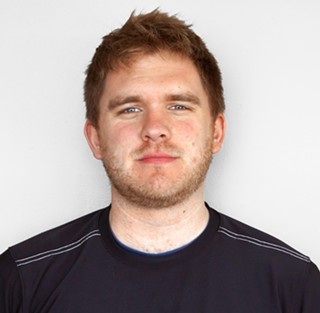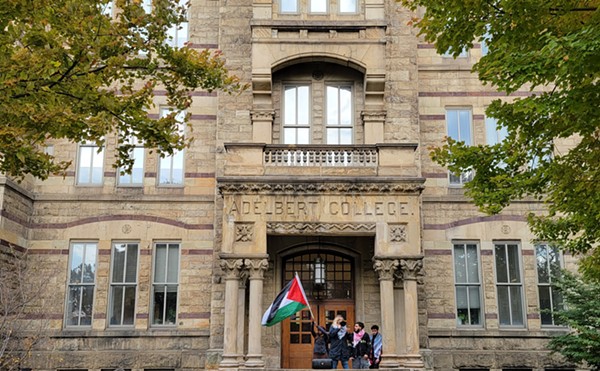"Great cities have great law schools," boasted Lawrence Mitchell at the City Club of Cleveland, flanked by the law school deans of the University of Toledo, University of Akron and Cleveland Marshall. It was January 2012, the beginning of Mitchell's second semester at the helm of the Case Western Reserve University School of Law, and he was holding court with the same confidence and charisma that had won over the search committee less than a year earlier. "We are the entry point for students from around the country, and increasingly, around the world, bringing talent to this area that previously had not been here."
The City Club's "Meet the Deans" event was a conversation about diversity, plummeting application rates and the value of an expensive law school education during a time when demand in that field has taken a nosedive.
"The economics are real and they're complex," he said. "What we've decided to do as a law school is cut our class size by 10 percent, which is going into effect this year. We're doing that for a number of reasons, not the least of which is we believe the restructuring of the legal profession is a common fact of life. We believe the demographic trends are going to lead to fewer applicants. We believe we ought to be concentrating our resources on a fewer number of students and doing a better job educating those students so they can fulfill the mission of our law school."
Off the stage, things weren't nearly as smooth.
Someone who had an axe to grind against Mitchell had handed out flyers to the City Club guests. "QUESTIONS SOMEONE SHOULD ASK DEAN MITCHELL," its header read, with six paragraphs below, each containing salacious rumors about who Mitchell had slept with and allegations of sexist comments. University administrators reportedly got a copy.
"Dean Mitchell, about half of all law students today are female. What should female law students expect from a dean who, in his short time in Cleveland, has already had affairs with a Case graduate student, a recent Case law grad, a local lawyer, and the girlfriend of [y]our personal assistant?"
"Dean Mitchell, what does it say about your attitude toward female students that you joked to Case faculty members that the Case graduate student you were having an affair with, "wasn't good for anything but keeping the bed warm?"
The note also mentioned his two divorces, one from a spouse who was a former student, the other a professor who was his subordinate.
Gossip spreads fast through the Cleveland legal community. One female student, a first-year at CWRU at the time, said the drama quickly entered the inbox of her online dating profile.
"Some guy claiming to be a lawyer in Cleveland messaged me and said, 'Did you hear about all this drama at the City Club?' and accused Lawrence Mitchell of this, that or the other. I was just astounded," she says. "All it said on my dating profile was I'm a law student in town."
Just four months into his tenure at the law school, Lawrence Mitchell had already ruffled more than a few feathers with his overtly sexual come-ons and had quickly solidified his reputation as a heavy drinker with few personal or professional boundaries.
Nearly two years after the City Club fiasco, Lawrence Mitchell and Case Western Reserve University would face more than anonymous rumors.
***In 2011, Lawrence Mitchell left his longtime post as a professor at George Washington, one of the country's top law schools, for a new challenge: leading an unstable and money-hemorrhaging law school in the Rust Belt back to prominence. The 52-year old corporate law scholar had a sterling academic career on paper and Case Western was in the midst of trying to repair its image.
Not only was the law school market in a downturn, but Case had also been left in a lurch after a forced resignation of the last full-time law school dean, one who had alienated wealthy alumni during his tenure. Complicating its leadership crisis, the university was also struggling with fundraising and its place on the almighty (but seemingly arbitrary) U.S. News and World Report law school rankings.
Barbara Snyder, who began her academic career as a CWRU law professor in the mid-1980s before working her way up the administrative ladder with positions at Ohio State, was named Case president in 2007. A year prior, Gary Simson, a law professor at Cornell who emphasized the social justice tenets of the profession, replaced Gerald Korngold at the top of the Case law school. Simson's time as dean was rough — the school dipped in the U.S. News rankings (he had been a staunch critic of the methodology used in those rankings), CWRU students' bar passage rates became the second lowest among the nine law schools in the state of Ohio (75 percent for first-time test takers, compared to 95 percent at Cleveland Marshall), and he had created testy relationships with wealthy Case alumni (those coveted donors who write the big checks).
Snyder is a fundraiser. Snyder is a schmoozer. Simson didn't jibe with her needs. Sources say she created a panel to review his position, dismissed him in 2008 and then crafted a press release announcing that Simson had agreed to resign. "He was unceremoniously dumped," a source says. "They pretended he was resigning, but he wasn't."
The school installed Bob Rawson as interim dean while they looked for a permanent candidate. Rawson, a partner at Jones Day, was universally praised for guiding the law school through a tough period, though that interim stint wasn't supposed to last three years. Case, it seemed, had trouble attracting a permanent replacement.
And so, in late 2010 and early 2011, CWRU finally connected with Lawrence Mitchell. A 1981 Columbia law graduate, he spent the mid-1980s as a corporate lawyer for Wall Street firms before teaching at the Albany Law School of Union University and eventually landing on the faculty at George Washington in 1991.
By 2010, after 20 years on staff, Mitchell was eying other opportunities. He had sought the dean position at the Brooklyn Law School (in his hometown) and, according to reports at the time, was a finalist for jobs at the University of San Diego School of Law and the University of Colorado Boulder Law School. Mitchell had also sought the recently opened dean position at the George Washington law school, sources said, but took his name out of the running early on when he realized he wouldn't get it.
What set Mitchell apart from other finalists for the CWRU job — including former Lt. Gov. Lee Fisher and former Federal Election Commission Chairman Bradley Smith — was his "brutal honesty" while laying out his plans for the school. He illustrated Case's myriad problems, outlined small tasks he'd tackle in order to correct them, pledged to focus on the school's U.S. News ranking and presented himself as a donor's friend. He was the anti-Gary Simson; he valued corporate law and making money over public-interest work. He was Snyder's kind of law school dean.
But Mitchell also came with plenty of red flags, the kind of warnings that did not bode well for someone about to take over that much power. Taken individually, they could be written off as inconsequential. Taken as a whole, they showed a pattern of behavior that could very well cause problems down the road.
In Mitchell's case, it was widely known throughout law school faculty, the search committee and the administration that he had a documented history of sexual relationships with at least one student and people under his authority. He was 43 when he married a 24-year-old law student in April 2000. They would be divorced soon after. In 2004, Dalia Tsuk joined the faculty at George Washington as an associate professor, a subordinate to Mitchell. Mitchell and Tsuk would get married shortly later. After adopting a daughter, the relationship ended in 2010.
Pam Davis, the successful dean of Case's medical school, co-chaired the university's search committee. According to attorney Daniel Dubè, who was a student of Mitchell's at GW and who came with him to Case as his personal assistant, Mitchell told him that Davis had discouraged the university from hiring him.
"He told me that the dean of the med school had discouraged his being hired, as she feared him to be a substance abuser," Dubè said in a written statement to Scene. "Specifically, Mitchell cited her as having been horrified that he had two highball scotches at an important event. He intended to convey that she was a prude. At the time, he claimed to have learned this information from provost Bud Baeslack."
Despite these concerns, Snyder tabbed Mitchell as the official pick and the board of trustees signed off. In April 2011, the school announced Mitchell as the new law school dean and Snyder bestowed him with a seven-year contract, according to a source. He was supposed to be the steadying force for a school that had faced so much uncertainty in previous years.
Mitchell packed up and moved to Cleveland alone. He bought a $575,000, five-bedroom house in Cleveland Heights, just a few miles from campus, with plenty of space to host parties for students and faculty.
***










